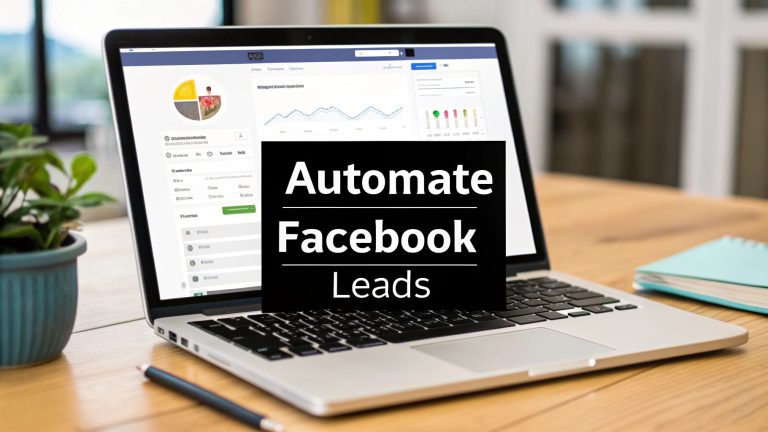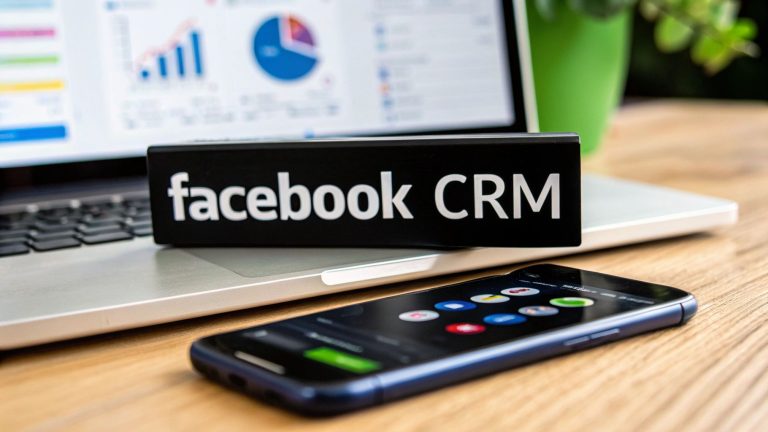Top 12 Small Business CRM Solutions for 2025
In today's competitive landscape, managing customer relationships effectively is the key to survival and growth. For small businesses, juggling leads from Facebook ads, tracking client conversations, and nurturing prospects can quickly become overwhelming, leading to missed opportunities and stalled sales pipelines. This is where the right small business crm solutions transform chaotic spreadsheets and sticky notes into a streamlined engine for growth.
But with hundreds of options available, how do you choose the one that fits your specific needs without breaking the bank? This guide cuts through the noise. We will analyze the top 12 platforms, diving deep into their practical features, honest limitations, and ideal use cases for teams like yours. We’ll explore everything from all-in-one powerhouses to hyper-focused tools, helping you find the perfect system to organize contacts, automate tedious tasks, and ultimately, close more deals. Each option includes screenshots and direct links to help you decide.
Beyond just CRM, small businesses can leverage various technologies to gain a competitive edge. For a broader perspective on how artificial intelligence can fuel your company's expansion, you might also explore other top AI tools for small business growth. Now, let's find the CRM that will become your new superpower.
1. LeadSavvy Pro
Best For: Streamlining Facebook Lead Ad Management
LeadSavvy Pro emerges as a powerful and uniquely positioned tool among small business CRM solutions, specifically engineered to solve a critical pain point for digital marketers: the cumbersome process of managing Facebook Lead Form submissions. Instead of relying on manual CSV downloads, a notoriously slow and error-prone task, this platform automates the entire workflow. It acts as a direct bridge, instantly syncing every new lead from your Facebook campaigns directly into either a dedicated Google Sheet or its clean, built-in CRM.
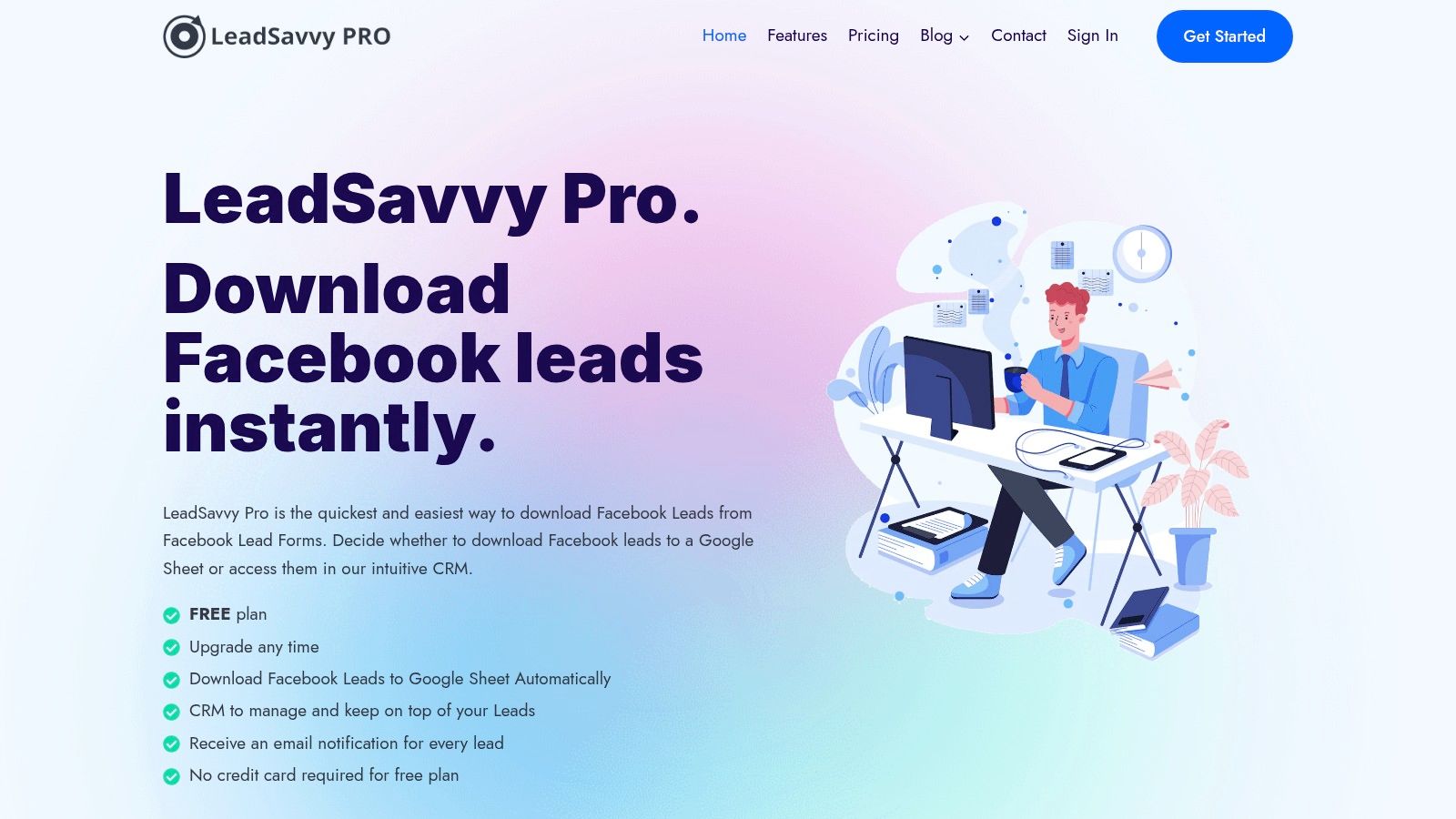
This automation is more than a convenience; it is a strategic advantage. The platform's real-time email notifications empower sales teams to follow up with prospects within minutes, drastically increasing conversion rates. For marketing agencies managing multiple client accounts, this system provides a scalable and efficient way to organize lead data without constant administrative overhead.
Key Strengths & Use Cases
LeadSavvy Pro stands out due to its focused functionality and exceptional ease of use. While many CRMs try to be everything to everyone, LeadSavvy Pro perfects its niche.
- Instant Lead Retrieval: Automates the transfer of leads from Facebook to Google Sheets or its integrated CRM, eliminating manual data entry.
- Rapid Sales Follow-Up: Real-time email alerts ensure your team can engage with hot leads immediately, capitalizing on peak interest.
- Mobile Accessibility: The intuitive, web-based CRM allows you to access and manage lead information from any desktop or mobile device.
- Simplified Onboarding: With a clear step-by-step video tutorial, users can connect their Facebook account and automate their first campaign in under five minutes.
Its user-friendly interface makes it an excellent choice for businesses without a dedicated IT department. The platform’s value is immediately apparent: it saves time, reduces the risk of leads falling through the cracks, and ultimately helps maximize the ROI on Facebook ad spend.
Why it's our top pick: LeadSavvy Pro provides a targeted, highly effective solution to a common and costly problem. By automating Facebook lead management so seamlessly, it delivers a direct and measurable boost to a business's operational efficiency and sales pipeline.
Pricing and Access
Accessibility is a core principle for LeadSavvy Pro. It offers a generous free forever plan that doesn't require a credit card to get started, making it a risk-free option for any business looking to test its capabilities. For those needing higher volume or additional features, it provides several affordable tiered pricing plans, ensuring the solution can scale with your company's growth.
- Pros:
- Eliminates manual CSV downloads from Facebook.
- Instant email notifications enable rapid lead response.
- Offers a robust free plan and affordable upgrades.
- Extremely user-friendly with fast setup.
- Cons:
- CRM features are streamlined and may not replace a full-featured, standalone platform for complex needs.
- Exclusively focused on Facebook Lead Forms; requires other tools for different lead sources.
Website: https://leadsavvy.pro
2. Salesforce Starter Suite (Salesforce)
For small businesses with ambitious growth plans, Salesforce Starter Suite presents a compelling entry point into a world-class ecosystem. It bundles the core functionalities of sales, service, and marketing into one simplified package, stripping away the complexity often associated with enterprise-level Salesforce editions. This makes it an ideal choice for teams who want to start with a recognized market leader and avoid the hassle of future data migration as they scale.
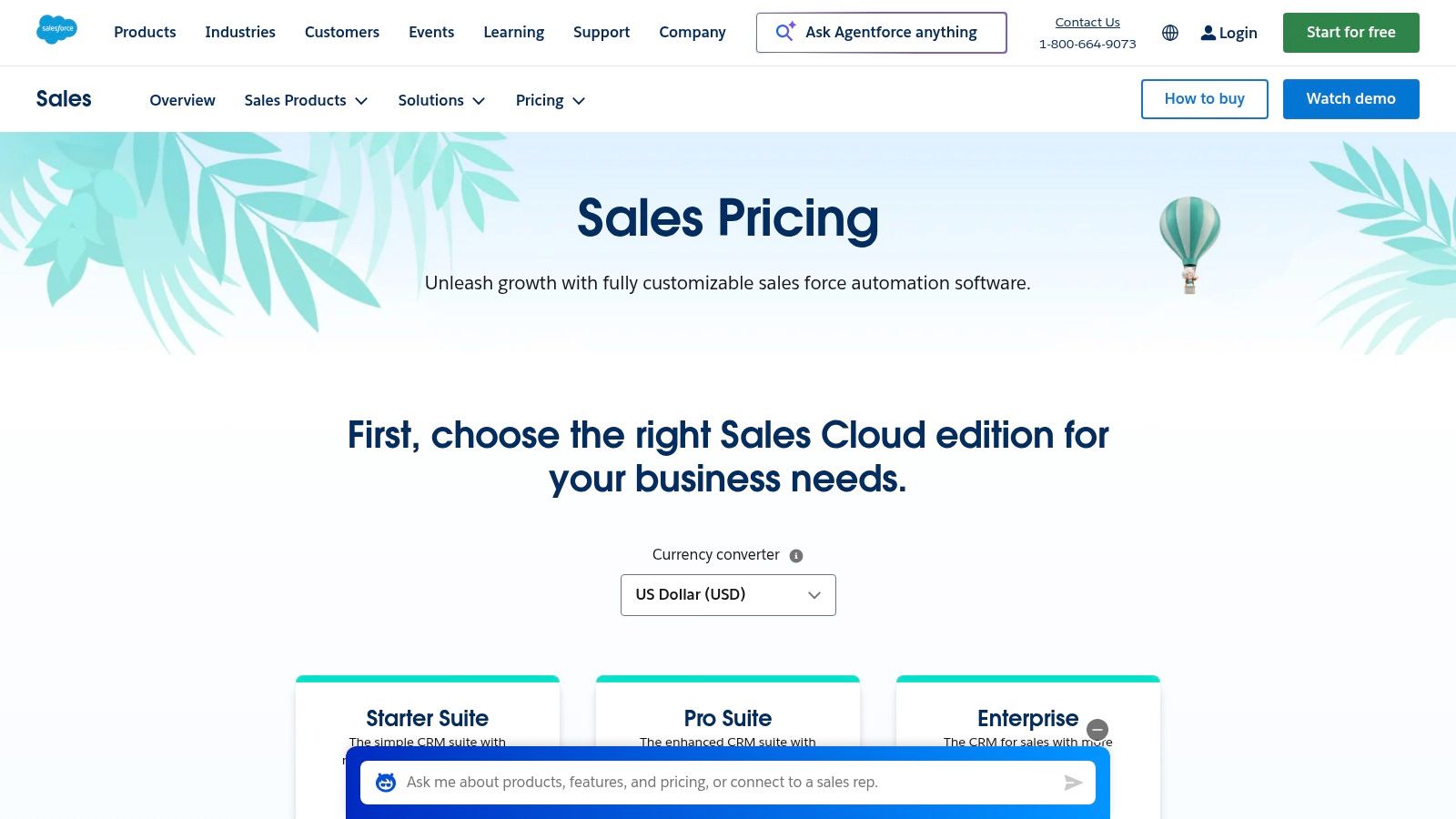
The platform focuses on foundational CRM tasks like lead, contact, and opportunity management, paired with an easy-to-use guided setup. While it's more streamlined, it doesn't skimp on power, still providing access to the vast Salesforce AppExchange for customizations. The clear, built-in upgrade path to more advanced editions like Pro and Enterprise is its key differentiator among small business CRM solutions.
Key Details & Considerations
- Best For: Startups and small businesses planning for rapid scaling who want to build their operations on an industry-standard platform from day one.
- Pricing: The Starter Suite begins at $25 per user/month, but this tier requires annual billing. Higher tiers unlock more advanced features.
- Pros:
- Unmatched scalability within the Salesforce ecosystem.
- Access to the extensive AppExchange for integrations.
- Strong brand recognition and reliability.
- Cons:
- Annual billing can be a significant upfront cost.
- The total cost can rise quickly with add-ons or as you upgrade.
For a deeper dive into how it compares with other major players, explore this detailed Salesforce vs. Zoho breakdown.
Website: https://www.salesforce.com/sales/pricing/
3. HubSpot Customer Platform (Sales/Svc/Marketing Hubs + Smart CRM)
HubSpot offers a powerful and accessible ecosystem built around its perpetually free CRM. This model allows businesses to start with foundational contact management tools at no cost and then add specialized "Hubs" for sales, marketing, and service as their needs evolve. Its user-friendly interface and low-friction onboarding process make it one of the most popular small business crm solutions, especially for teams prioritizing ease of use and integrated marketing capabilities.
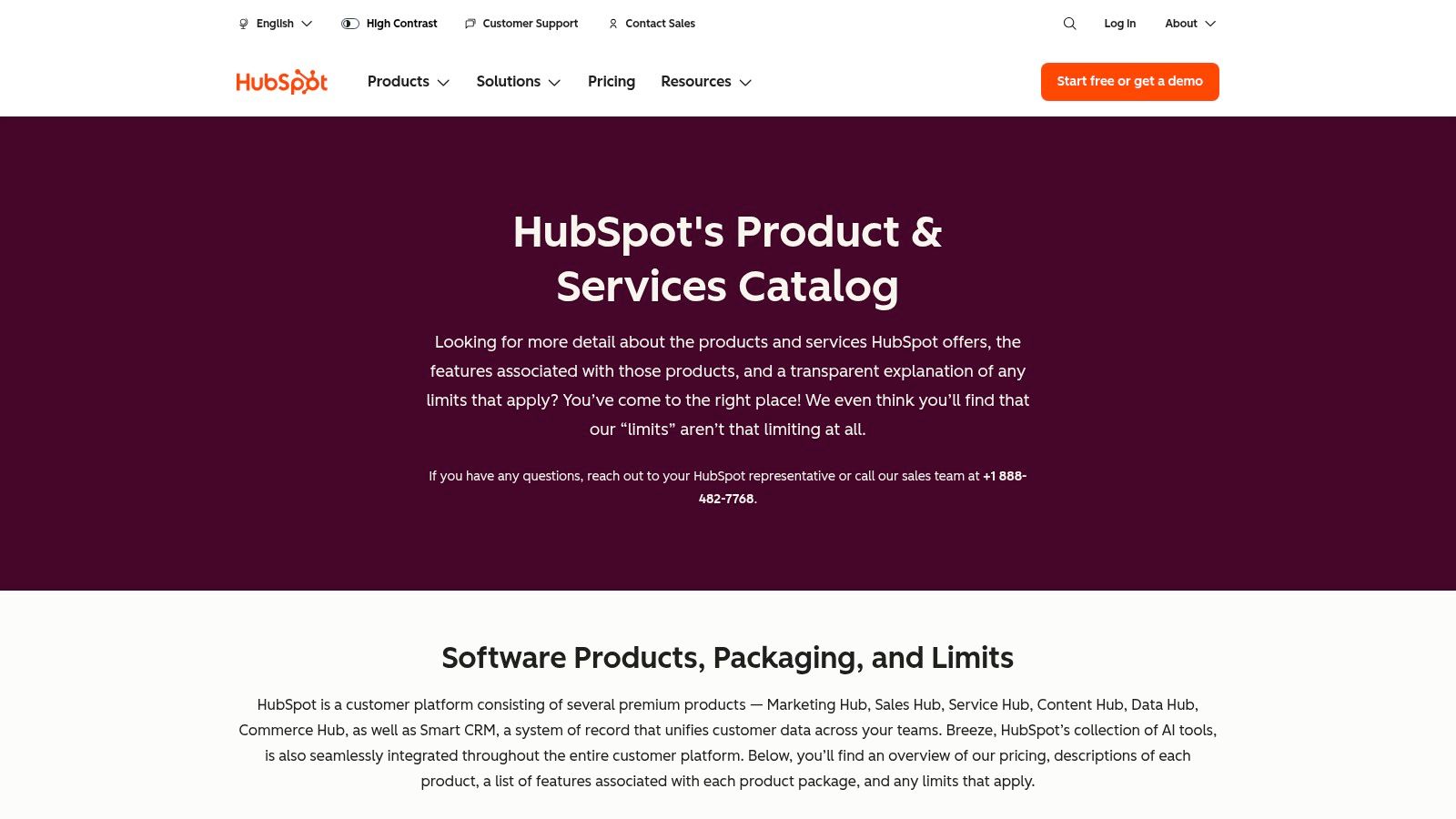
The platform’s strength lies in its unified nature. You can manage email tracking, meetings, live chat, and forms from one place, ensuring a seamless flow of data across departments. While the free tools are generous, unlocking true power with features like marketing automation and advanced reporting requires upgrading to paid Professional tiers. HubSpot's extensive integration marketplace and strong educational content further solidify its position as a top contender for growing businesses.
Key Details & Considerations
- Best For: Businesses that want an all-in-one platform with a strong focus on inbound marketing and a very low barrier to entry.
- Pricing: The core CRM is free. Paid "Hub" bundles start at $15 per seat/month (billed annually), with costs increasing based on features and contact list size.
- Pros:
- Excellent free-forever CRM is perfect for getting started.
- Intuitive, clean user interface reduces the learning curve.
- Scales from a simple CRM to a complete enterprise-level platform.
- Cons:
- Marketing Hub pricing is contact-based and can become expensive quickly.
- Advanced automation and customization are locked behind higher-priced tiers.
Website: https://legal.hubspot.com/hubspot-product-and-services-catalog
4. Zoho CRM
Zoho CRM is a powerhouse in the small business CRM solutions space, known for offering an exceptionally broad feature set at a highly competitive price point. It goes beyond basic contact management, providing robust sales automation, detailed analytics, and forecasting tools that help small teams operate with big-company efficiency. The platform is especially appealing for businesses that want a unified ecosystem, as it integrates seamlessly with Zoho’s extensive suite of business apps, including Zoho Books, Projects, and Desk.
The platform empowers users with customizable sales pipelines, lead and deal management, and even includes Zia, an AI-powered assistant on its higher tiers, to provide intelligent insights. With over 600 third-party integrations alongside deep connectivity with Google and Microsoft products, its flexibility is a major draw. This combination of affordability, scalability, and deep functionality makes it a top contender for SMBs seeking a comprehensive, long-term solution.
Key Details & Considerations
- Best For: Small to mid-sized businesses that need a powerful, all-in-one CRM with extensive customization options and want to build their entire business software stack within a single ecosystem.
- Pricing: A free-forever plan is available for up to 3 users. Paid plans start at $14 per user/month, billed annually.
- Pros:
- Competitive pricing that provides robust features.
- Broad native app suite for a unified business system.
- Highly flexible configuration and automation rules.
- Cons:
- Has a steeper learning curve compared to simpler CRMs.
- Advanced AI and customization features are restricted to higher-tier plans.
For an in-depth analysis of how Zoho compares to other top options, review this guide to the best CRM for small business.
Website: https://www.zoho.com/crm/
5. Pipedrive
For sales teams that live and breathe the deal pipeline, Pipedrive offers an intuitive, activity-based CRM designed to drive action. Its core strength lies in its visual interface, which allows users to see their entire sales process at a glance and move deals forward with simple drag-and-drop functionality. This sales-first approach makes it one of the most straightforward small business crm solutions for teams focused purely on closing deals and improving sales velocity.
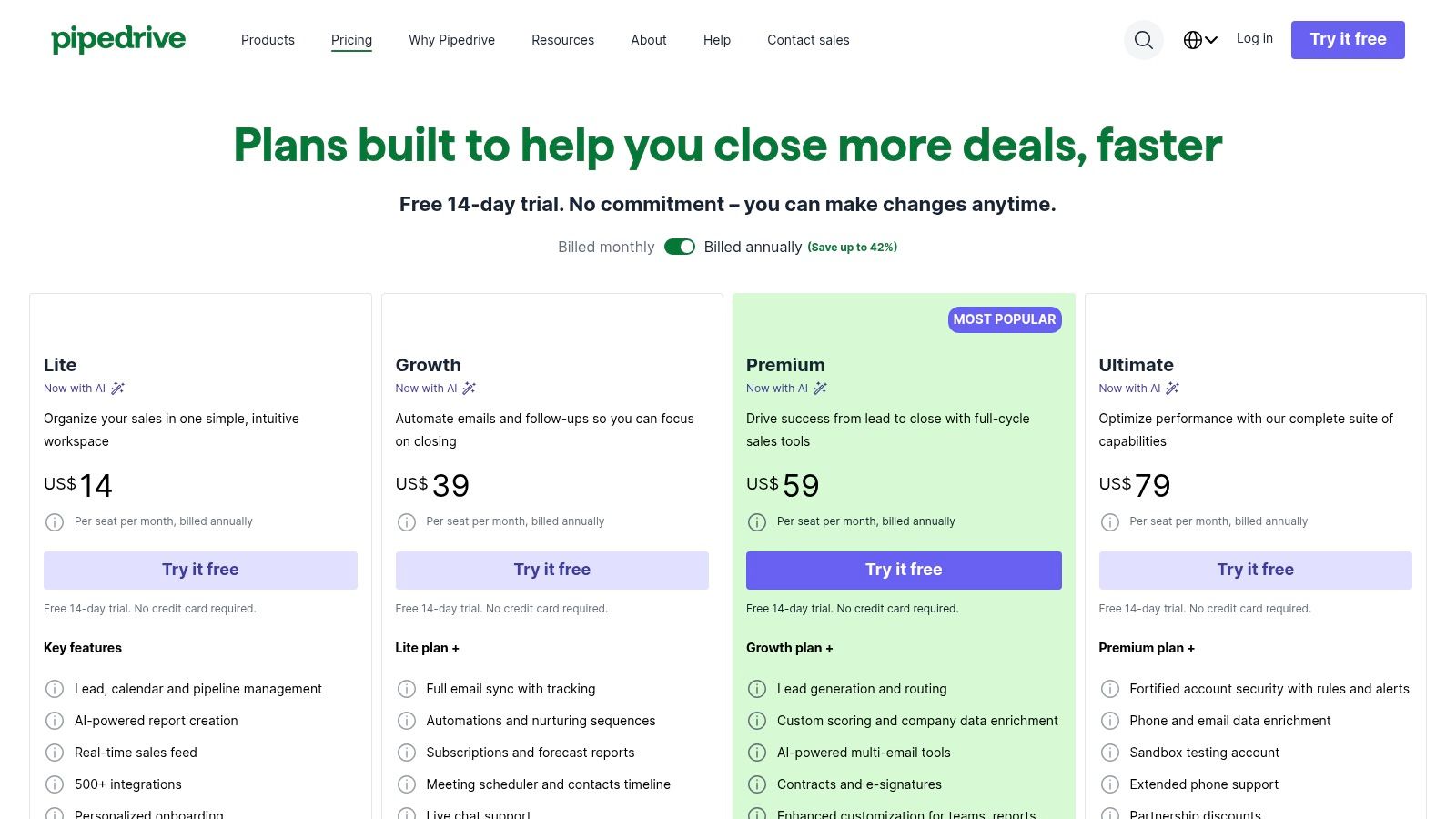
Pipedrive minimizes administrative overhead, enabling reps to spend more time selling rather than getting bogged down in data entry. While its base functionality is centered on sales, the platform offers a rich marketplace with over 500 integrations and powerful add-ons like LeadBooster for lead generation and Campaigns for email marketing. This allows businesses to build a customized stack on a simple, yet powerful, foundation.
Key Details & Considerations
- Best For: Small to mid-sized sales teams that need a visually intuitive, easy-to-adopt CRM to manage their deal flow and sales activities effectively.
- Pricing: Plans start at $14.90 per user/month when billed annually. A 14-day free trial is available for all tiers.
- Pros:
- Fast adoption with minimal admin overhead and training required.
- Excellent automation tools become available at mid-tier plans.
- Transparent and competitive per-seat pricing.
- Cons:
- Key reporting and advanced features are often locked behind higher-priced tiers.
- Marketing features are treated as separate add-ons, not native to base plans.
Website: https://www.pipedrive.com/pricing
6. monday sales CRM
For businesses that view sales as a project, monday sales CRM offers a highly visual and flexible approach. Built on the popular monday.com Work OS, it excels at merging CRM functionalities with powerful project management and task workflows. This makes it an outstanding choice for teams that manage complex, multi-stage sales cycles or need to seamlessly transition customers from sales to post-sale onboarding and project delivery, all within a single unified platform.
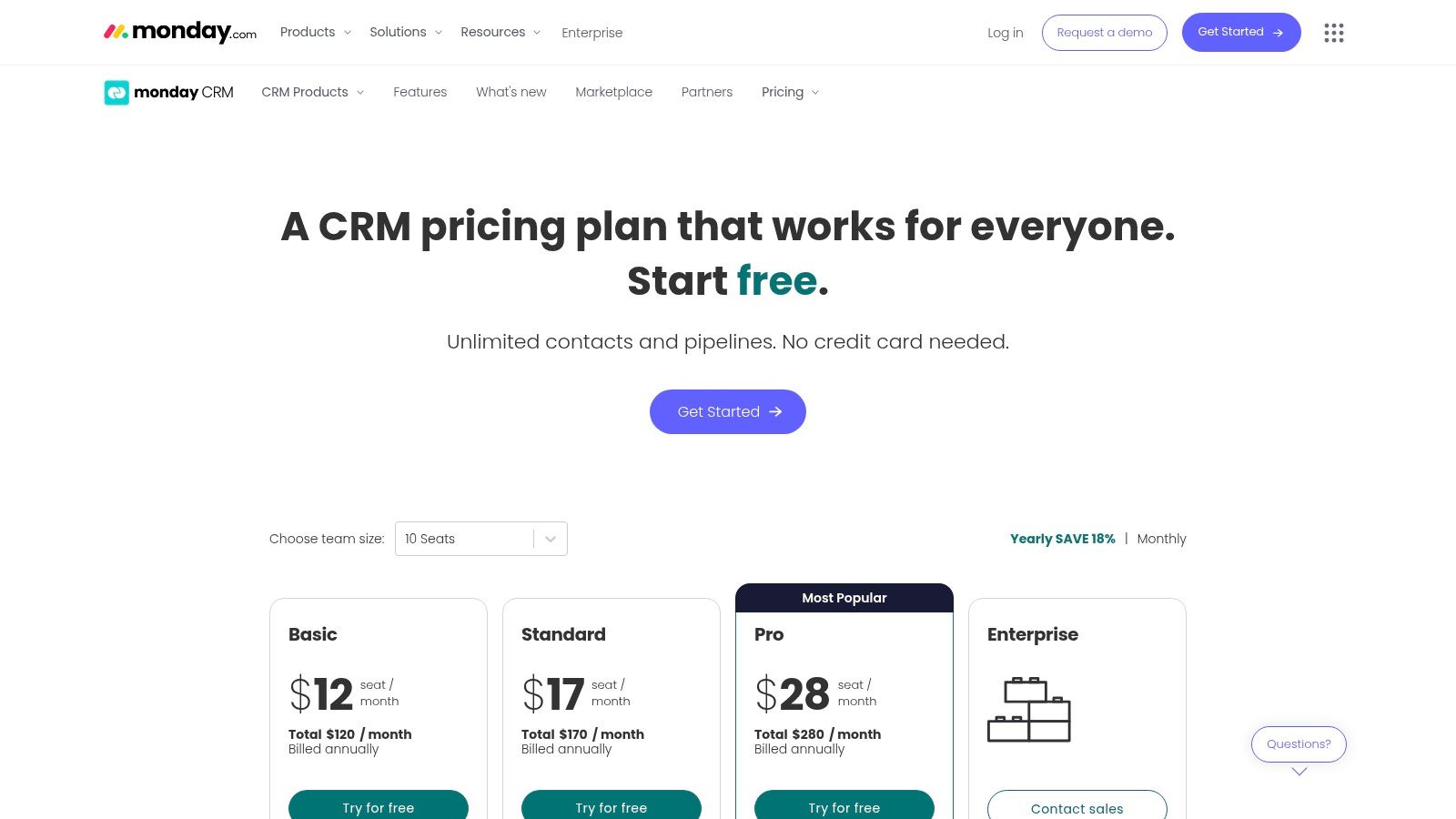
The platform is renowned for its customizable boards, visual pipelines, and powerful automations that streamline repetitive tasks. Teams can leverage over 200 templates to get started quickly and build custom dashboards for at-a-glance visibility into team performance and deal progression. Its key differentiator is its ability to serve as a central hub for all work, not just sales, making it one of the more versatile small business crm solutions available.
Key Details & Considerations
- Best For: Teams that need a CRM tightly integrated with project and task management, especially those already using the monday.com ecosystem.
- Pricing: Starts at $12 per seat/month (billed annually) with a minimum of 3 seats required. A 14-day free trial is available, but there is no perpetual free plan.
- Pros:
- Highly configurable for a wide variety of business processes.
- Unifies sales and post-sale work in one collaborative space.
- Excellent for teams already familiar with the monday.com interface.
- Cons:
- Pricing structure with minimum seat packs can be costly for very small teams.
- Lacks a dedicated free CRM tier for businesses on a tight budget.
Website: https://monday.com/crm/pricing
7. Freshsales by Freshworks
Freshsales is a powerful, user-friendly CRM solution designed to get small business teams up and running quickly. It stands out by integrating core communication channels like phone, chat, and email directly into the platform, eliminating the need for multiple disparate tools. This all-in-one approach streamlines engagement and provides a complete, 360-degree view of every customer interaction without a complicated setup process.
The platform is powered by Freddy AI, which offers intelligent lead scoring, deal insights, and sales forecasting to help teams prioritize their efforts effectively. With features like multiple sales pipelines and a generous free plan, Freshsales offers one of the best value propositions among small business crm solutions for teams that need robust functionality without a steep learning curve or high initial investment.
Key Details & Considerations
- Best For: Small to mid-sized businesses looking for an intuitive, all-in-one CRM with built-in communication tools and AI-powered insights.
- Pricing: A free plan is available for up to 3 users. Paid plans start at $15 per user/month (billed annually) with a 21-day free trial.
- Pros:
- Excellent value, especially at the lower-priced tiers.
- Fast implementation with 24×5 customer support.
- No minimum user requirement, making it accessible for solo entrepreneurs.
- Cons:
- Advanced AI and customization features are reserved for higher-tier plans.
- Add-ons like chatbots or CPQ can increase the overall cost.
Website: https://www.freshworks.com/crm/pricing/
8. Keap (formerly Infusionsoft)
Keap, widely known by its former name Infusionsoft, excels at combining CRM with powerful marketing and sales automation tools. It's designed for established service-based businesses that want to automate their entire customer lifecycle, from lead capture and nurturing to appointment scheduling and final payment. This all-in-one approach streamlines operations by keeping essential functions under one roof.
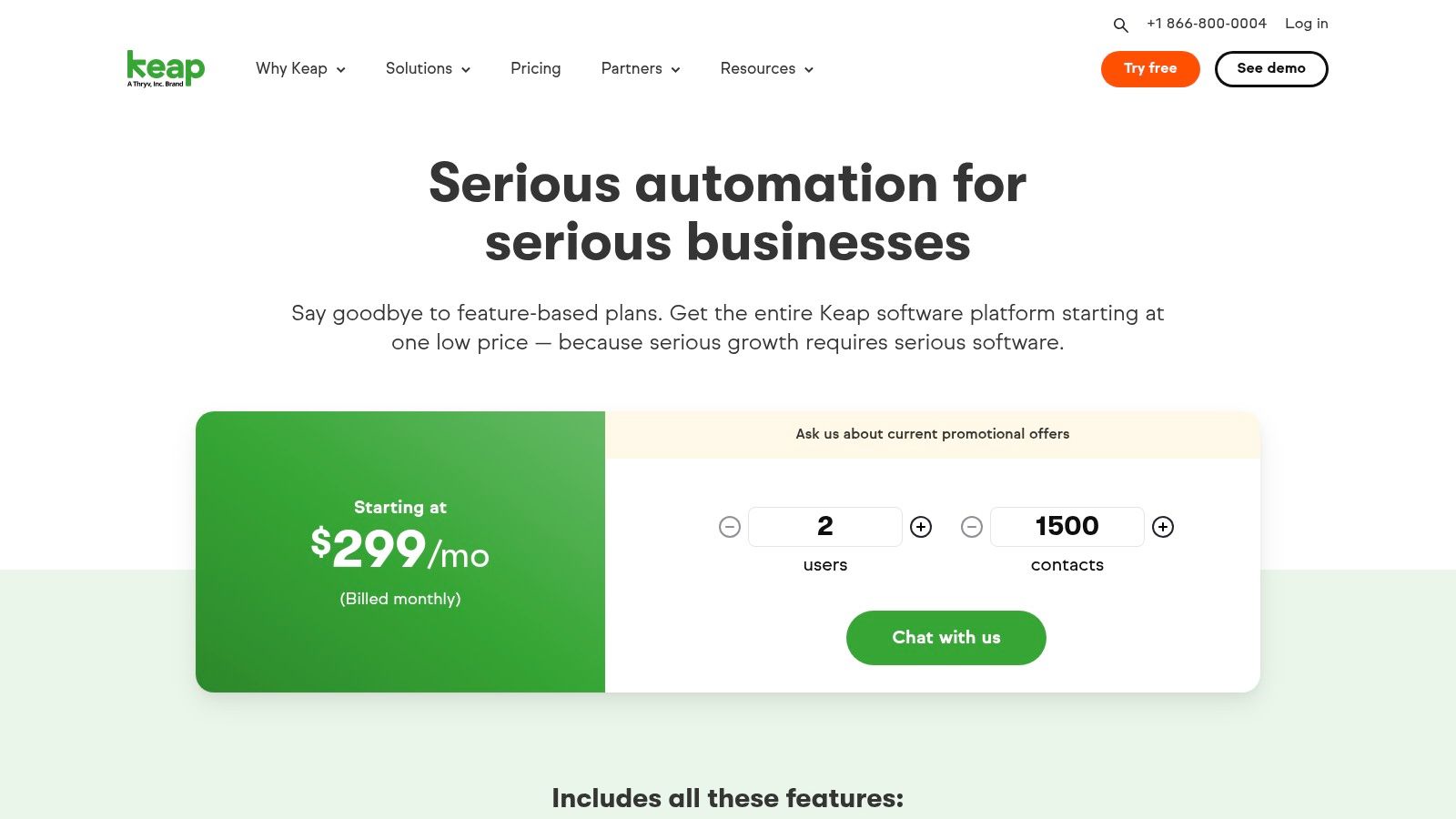
The platform’s strength lies in its "Easy Automations" builder, which helps users create sophisticated follow-up campaigns via email and SMS without needing deep technical expertise. The integration of invoicing and payments directly within the CRM is a significant advantage, reducing the need for separate financial tools. With a strong focus on support, many plans include a dedicated success manager to help users maximize their investment.
Key Details & Considerations
- Best For: Service-based small businesses (coaches, consultants, home services) that need robust automation for marketing, sales, and client management.
- Pricing: Plans start around $159/month for 1,500 contacts and 2 users, with costs scaling based on contact and user count.
- Pros:
- Strong automation and lifecycle marketing in one platform.
- Concierge-style onboarding and excellent community resources.
- Built-in payment processing (Keap Pay) with transparent fees.
- Cons:
- Pricing can be higher than lighter CRM solutions, varying by contacts and users.
- Best value is realized when fully utilizing its advanced automation features.
Website: https://keap.com/keap-lite
9. Insightly
Insightly stands out by seamlessly blending traditional CRM functionalities with robust, built-in project management. This unique combination makes it a powerful choice for service-based businesses, agencies, and teams that manage complex, multi-stage client engagements post-sale. The platform offers a modular approach, allowing users to start with the core CRM and later add on Marketing, Service, or AppConnect modules as their needs evolve, or bundle them together from the start.
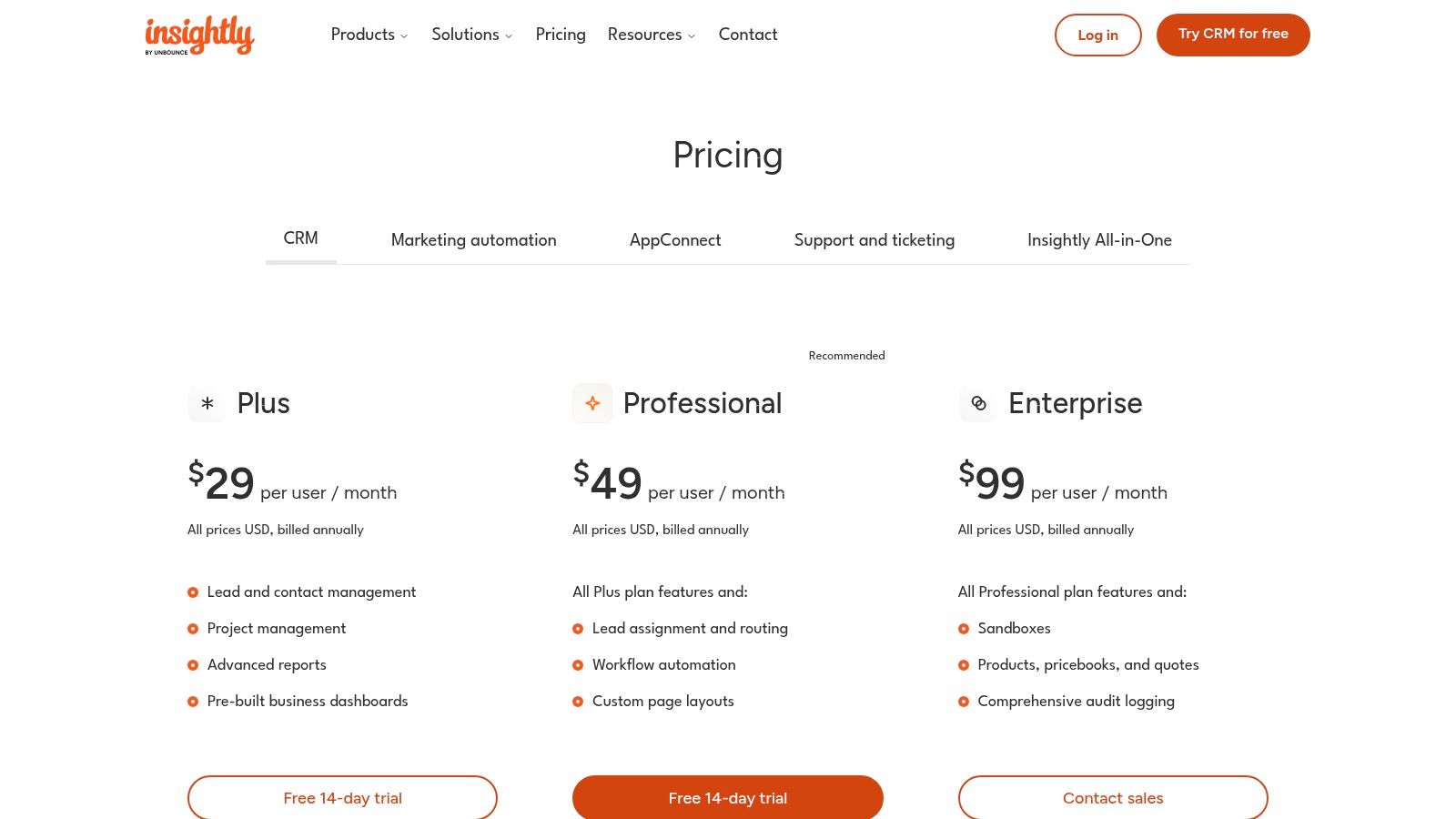
The platform is designed to provide a unified view of the customer journey, from lead acquisition to project delivery. With features like workflow automation and customizable dashboards, Insightly helps streamline operations without requiring extensive technical expertise. Its ability to manage projects directly within the CRM eliminates the need for separate tools, creating a single source of truth for all client-related activities and one of the most flexible small business crm solutions available.
Key Details & Considerations
- Best For: Service-based businesses, consulting firms, and marketing agencies that need to manage the entire client lifecycle, from sales pipeline to project execution, within one system.
- Pricing: The CRM-only "Plus" plan starts at $29 per user/month, billed annually. Bundled "All-in-One" plans are also available.
- Pros:
- Native project management features are a key differentiator.
- Transparent, tiered pricing with available bundle discounts.
- Modular design allows the platform to grow with your business.
- Cons:
- Can feel overly complex for teams needing only basic contact management.
- Advanced features and automation are limited to higher-priced tiers.
For businesses like marketing agencies, this integration is particularly valuable, as you can see in this guide to CRM for agency success.
Website: https://www.insightly.com/pricing-plans/?plan=crm
10. Less Annoying CRM
True to its name, Less Annoying CRM (LACRM) is designed for small businesses and individuals who find traditional CRM platforms overly complicated and expensive. It rejects the tiered pricing and feature-gating common in the industry, offering a single, straightforward plan that includes everything. This simplicity is its greatest strength, making it one of the most accessible and easy-to-learn small business crm solutions available.
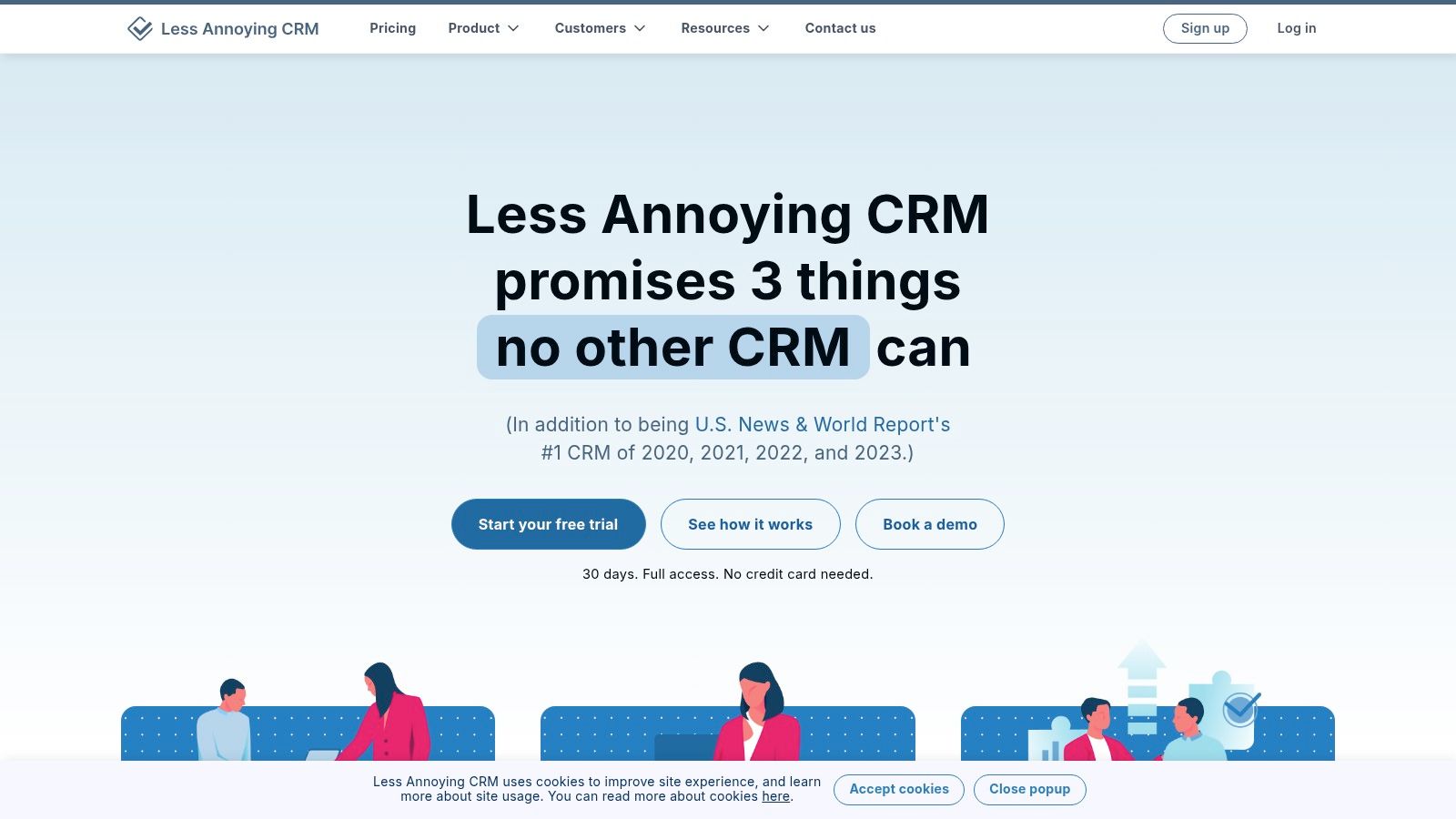
The platform provides all the core functionalities needed for effective relationship management, including a centralized contact database, a simple sales pipeline, and integrated task and calendar management. LACRM’s entire philosophy centers on removing friction, from its 30-day free trial that requires no credit card to its highly-praised free phone and email support. It's the ideal choice for teams that need to get organized quickly without a steep learning curve or complex setup.
Key Details & Considerations
- Best For: Solo entrepreneurs and small teams who need a simple, no-frills CRM and prioritize ease of use and transparent pricing above all else.
- Pricing: A single flat rate of $15 per user/month with no contracts or hidden fees.
- Pros:
- Extremely simple and transparent pricing.
- Very low learning curve allows for quick adoption.
- Excellent and widely praised customer support.
- Cons:
- Lacks advanced automation and reporting features.
- Limited number of native integrations compared to larger platforms.
Website: https://www.lessannoyingcrm.com/
11. Close CRM
Close CRM is a high-velocity sales platform designed for teams that live on the phone and in their email inbox. It tightly integrates communication tools like calling, SMS, and email directly into the CRM, eliminating the need for separate dialer or messaging applications. This all-in-one approach is perfect for outbound sales teams and founders who need to power through call lists and follow-up sequences without switching between tabs.
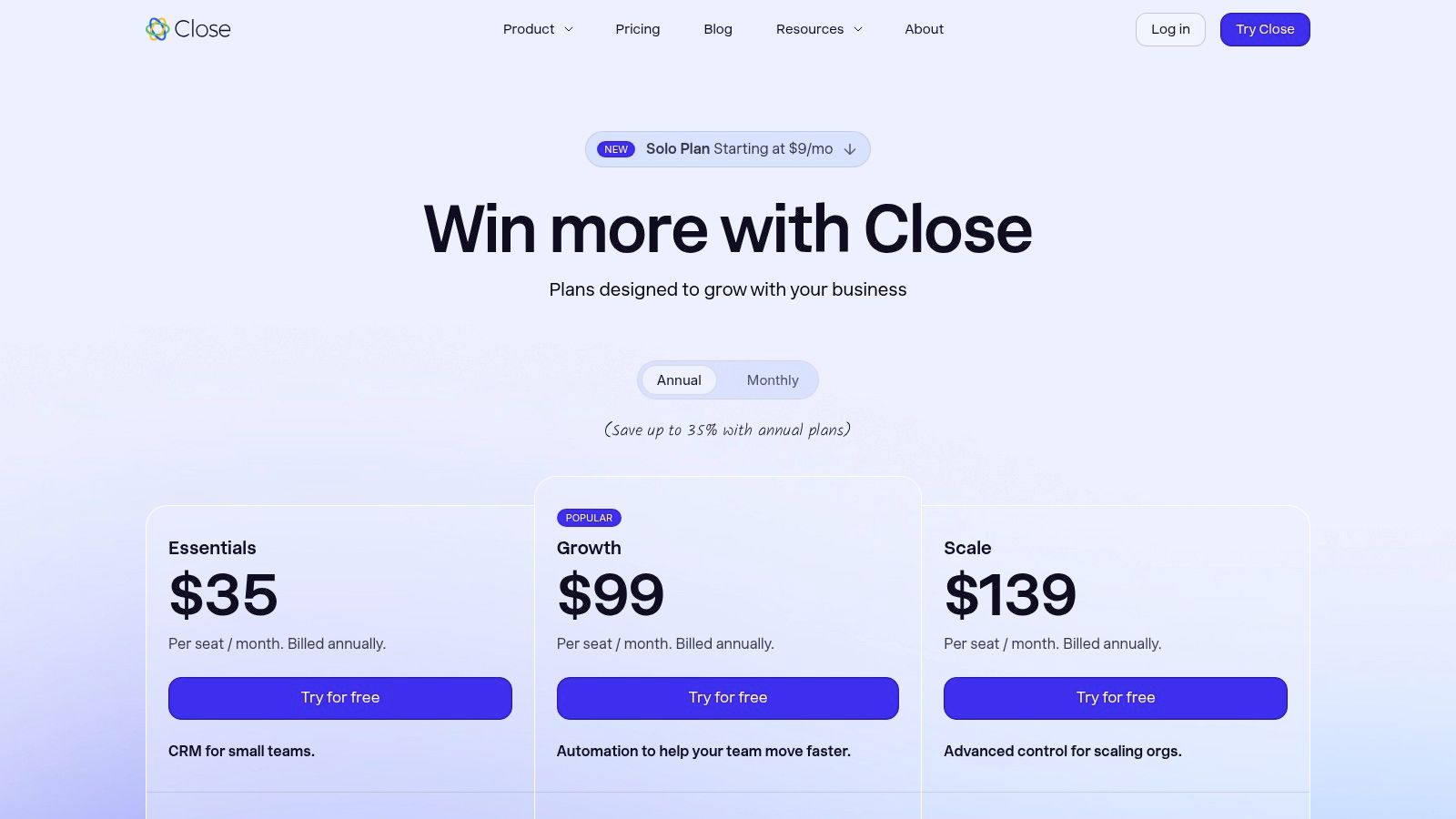
The platform shines with its powerful workflow automation, featuring built-in power and predictive dialers that drastically increase call volume. Its email sequences, AI-powered writing assistance, and detailed activity tracking provide a complete toolkit for managing the entire sales cycle. For businesses where direct outreach is the primary growth engine, Close stands out as one of the most efficient small business crm solutions available.
Key Details & Considerations
- Best For: Outbound-focused sales teams, startups, and SMBs that require built-in calling and robust communication automation to maximize daily outreach.
- Pricing: Plans start at $25 per user/month (billed annually) for the "Founder" tier. Higher tiers unlock features like the power dialer and call coaching.
- Pros:
- Built-in communication tools (calling, SMS, email) streamline workflows.
- Powerful automation and dialers designed for high-volume sales.
- Transparent per-seat pricing with a plan available for solo users.
- Cons:
- Telephony usage (calls/SMS) adds variable costs on top of the subscription.
- Lacks the broad marketing and service features found in all-in-one suites.
Website: https://www.close.com/pricing
12. G2 CRM Category (Comparison/Buying Marketplace)
When the sheer number of options is overwhelming, a marketplace like G2 offers a structured way to navigate the landscape. Instead of being a CRM itself, G2 is a comprehensive software review platform where you can compare hundreds of tools side-by-side, filtered specifically for small business needs. It aggregates real user reviews, providing invaluable, unbiased insights into usability, support quality, and implementation.
This resource is powerful for creating a shortlist of potential small business crm solutions. You can filter by company size, specific features like "email marketing" or "lead scoring," and user satisfaction ratings. The platform’s comparison grids and reports offer a data-driven approach to decision-making, helping you move beyond marketing claims and see how products perform in the real world. It's a crucial first step before committing to demos.
Key Details & Considerations
- Best For: Businesses in the initial research phase who want to compare a wide range of CRM options based on verified user feedback and specific feature requirements.
- Pricing: Free to use for browsing, comparing, and reading reviews. Vendors pay for enhanced profiles and lead generation features.
- Pros:
- Saves significant time in identifying top-rated, SMB-friendly CRMs.
- Authentic user reviews provide context on pros, cons, and actual use cases.
- Excellent for comparing feature sets and perceived value across multiple platforms.
- Cons:
- Sponsored placements can influence visibility, so it's wise to look beyond the top results.
- Review details can vary; always verify specifics on the vendor's own website.
Website: https://www.g2.com/categories/crm
Top 12 Small Business CRM Solutions Comparison
| Product | Core Features/Characteristics | User Experience/Quality ★ | Value Proposition 💰 | Target Audience 👥 | Unique Selling Points ✨ |
|---|---|---|---|---|---|
| 🏆 LeadSavvy Pro | Automates Facebook lead retrieval; Google Sheets & built-in CRM sync | Intuitive UI, desktop & mobile, real-time email alerts ★★★★☆ | Free plan, easy upgrades 💰 | SMBs, marketers, agencies, startups 👥 | No CSV downloads; step-by-step tutorials ✨ |
| Salesforce Starter Suite | Lead/contact/opportunity mgmt, email integration | Market leader, scalable ★★★★☆ | Annual billing, scalable with add-ons 💰 | Growing businesses, enterprise-ready 👥 | Deep AppExchange ecosystem |
| HubSpot Customer Platform | Free CRM core + modular hubs | Easy onboarding and UI ★★★★☆ | Scales per seat and feature needs 💰 | Small teams, marketers, sales 👥 | Strong marketing & content tools |
| Zoho CRM | Sales automation, AI insights, deep integrations | Feature-rich, configurable ★★★★☆ | Competitive pricing 💰 | SMBs needing robust features 👥 | AI assistant, native apps suite |
| Pipedrive | Visual pipelines, drag & drop deals | Fast adoption, good automation ★★★★☆ | Per-seat pricing, 14-day trial 💰 | Small sales teams 👥 | Pipeline-centric, AI tools at mid tiers |
| monday sales CRM | CRM + project/task workflows | Highly configurable, dashboards ★★★★☆ | Seat-based pricing, no free tier 💰 | Teams needing workflow + CRM 👥 | Integration with monday.com platform |
| Freshsales by Freshworks | Multichannel engagement, AI insights | Easy setup, 24×5 support ★★★★☆ | Free plan up to 3 users 💰 | SMBs requiring multichannel 👥 | Freddy AI, built-in phone/chat |
| Keap (formerly Infusionsoft) | CRM + marketing/sales automation, payments | Concierge onboarding ★★★☆☆ | Higher pricing, value with automation 💰 | Service businesses, automation users 👥 | SMS/email automation, payment processing |
| Insightly | CRM + project mgmt, workflow automation | Transparent tiers, dashboards ★★★☆☆ | Bundle discounts 💰 | SMBs needing project & marketing 👥 | All-in-One CRM + Marketing + Service bundles |
| Less Annoying CRM | Simple CRM, contact/pipeline management | Very low learning curve ★★★☆☆ | Flat $15/user/mo; no hidden fees 💰 | Small businesses, solo users 👥 | Ultra-simple, strong support |
| Close CRM | Built-in calling/SMS, email automation | Sales-focused, automation ★★★★☆ | Per-seat pricing + variable telephony 💰 | Outbound/founder-led sales teams 👥 | Native power dialer, AI email assistant |
| G2 CRM Category (Marketplace) | User reviews, filter by size/feature | Real-world ratings, editorial ★★★★☆ | Free to use, pricing transparency 💰 | Buyers comparing CRMs 👥 | Large CRM marketplace & comparison tool |
Choosing Your Growth Partner: Final Thoughts on CRM Selection
Navigating the landscape of small business CRM solutions can feel overwhelming, but making an informed choice is one of the most impactful decisions you can make for your company's future. We've explored a dozen powerful contenders, from the all-encompassing ecosystems of HubSpot and Zoho to the sales-focused precision of Pipedrive and Close. Each platform offers a unique approach to managing the most critical asset you have: your customer relationships.
The key takeaway is that the "best" CRM is not a one-size-fits-all title. It's the solution that seamlessly integrates into your existing workflow, addresses your most significant pain points, and provides a clear path for scalability. Your ideal choice depends entirely on your specific business model, team size, and primary growth channels.
From Evaluation to Implementation: Your Action Plan
Before you commit, it's crucial to move from passive research to active evaluation. Use this checklist as your guide to making the final decision:
- Identify Your Core Need: Are you drowning in leads from Facebook ads like many modern marketers? A specialized tool like LeadSavvy Pro is built for that exact problem. Do you need a single source of truth for marketing, sales, and service? An all-in-one platform like Salesforce or HubSpot might be the answer.
- Run a Trial with Real Data: Don't just click through a demo. Sign up for a free trial and import a small, real-world sample of your contacts and leads. Test the daily tasks your team will perform, from sending emails to updating deal stages. This hands-on experience is the ultimate test of usability.
- Consider Long-Term Costs: Look beyond the attractive introductory price. Map out how costs will change as your team grows or as you add more contacts. A solution that seems budget-friendly today could become prohibitively expensive tomorrow.
- Evaluate Onboarding and Support: A powerful tool is useless if your team can't use it. Investigate the onboarding process, available training resources, and the quality of customer support. A platform with a steep learning curve and poor support can derail your entire implementation.
Beyond the Tool: Building a Growth Engine
Ultimately, a CRM is more than just software; it's the central nervous system of your growth strategy. It empowers you to build stronger, more personalized relationships at scale. The right platform automates tedious administrative work, freeing up your team to focus on what truly matters: connecting with customers and closing deals.
While your CRM is a vital internal growth engine, sometimes external expertise is needed to maximize its potential, especially in a competitive digital space. This is similar to choosing a growth partner like a performance marketing agency to amplify your lead generation efforts. Just as you'd vet an agency for its expertise, vet your CRM for its ability to support and enhance those efforts. The right technology, paired with the right strategy, creates an unstoppable force for business growth.
Ready to stop losing valuable Facebook leads and start converting them instantly? LeadSavvy Pro is the essential bridge between your ads and your sales process, ensuring every lead is captured and acted upon immediately. See how it can supercharge your lead management by visiting LeadSavvy Pro today.


